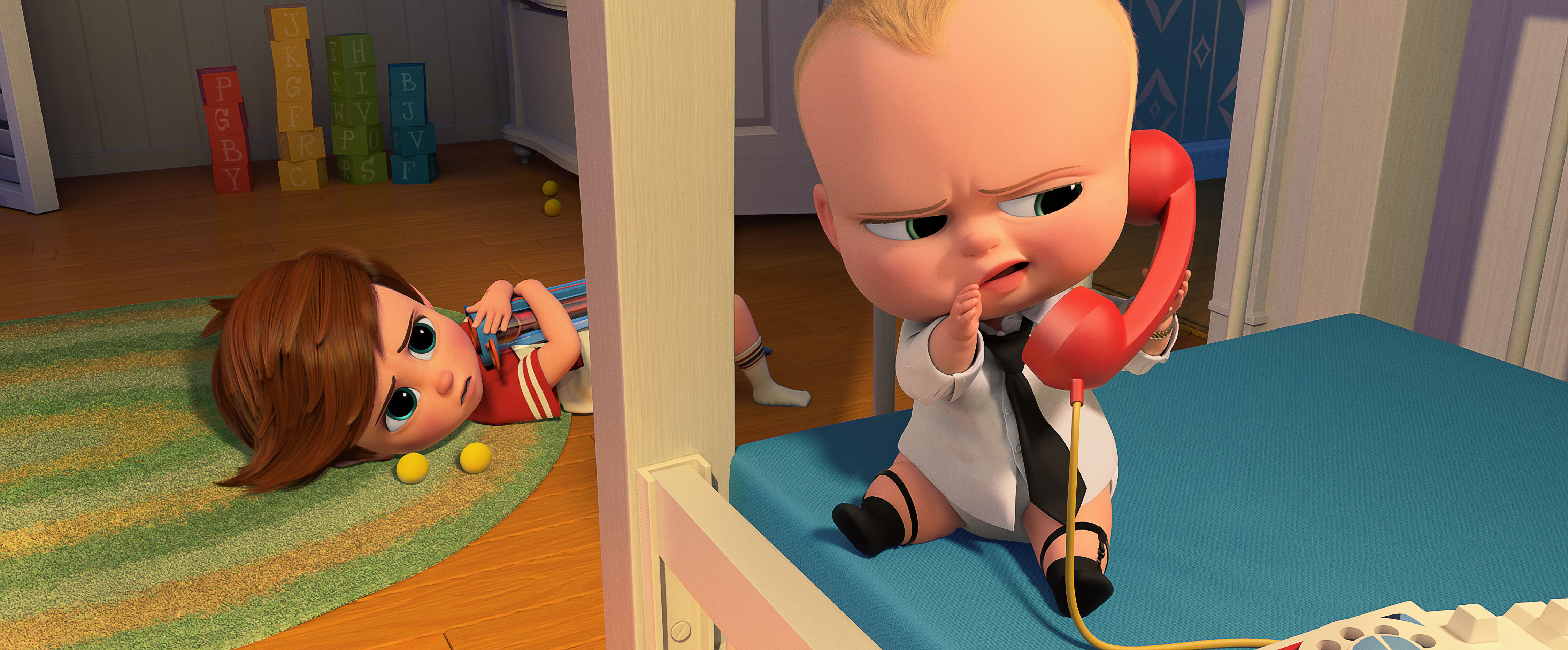Alec Baldwin, master of boss baby cartoons and boss baby presidents
And yet ... The Boss Baby and impersonating Trump both feel beneath Baldwin


A free daily email with the biggest news stories of the day – and the best features from TheWeek.com
You are now subscribed
Your newsletter sign-up was successful
The Boss Baby gives Alec Baldwin his highest-profile movie role in nearly a decade. Granted, it's a cartoon where Baldwin's face does not appear ... but his face is arguably no longer his best-known feature.
Baldwin's rumbling purr of a voice, the one that narrated The Royal Tenenbaums and so beautifully spun one-liners on 30 Rock, has become instantly recognizable. Lending that voice to an infant who secretly takes charge of his new family (much to the chagrin of his suspicious 7-year-old brother) makes Baldwin the movie's second lead, and puts his name above the title on some of its posters.
This marketing campaign coincides with another, higher-profile gig: Baldwin has spent the past six months as Saturday Night Live's Donald Trump. Baldwin's take on Trump, more satisfyingly nasty than the impressionists who came before him, depends in part on an incongruity that's essentially the reverse of the Boss Baby gag. Rather than playing an adorable baby who looks harmless but harbors secretly ruthless business instincts, Baldwin's Trump is an ill-tempered grotesque who has somehow ascended to the nation's highest office despite a childlike petulance and limited understanding of the world.
The Week
Escape your echo chamber. Get the facts behind the news, plus analysis from multiple perspectives.

Sign up for The Week's Free Newsletters
From our morning news briefing to a weekly Good News Newsletter, get the best of The Week delivered directly to your inbox.
From our morning news briefing to a weekly Good News Newsletter, get the best of The Week delivered directly to your inbox.
They're complementary roles, and represent something of a culmination for Baldwin. He started out as an impossibly handsome movie star (he was the screen's first Jack Ryan in The Hunt for Red October), but never became a full-on superstar like his Ryan successor Harrison Ford, or his contemporaries like Tom Hanks or Kevin Costner. The key to Baldwin's future, it turned out, was in his curtain-raising cameo for the film version of David Mamet's Glengarry Glen Ross. Baldwin was so funny, lacerating, and intimidating as the guy who lays out the stakes for the office of desperate real-estate scammers ("Third prize is you're fired") that the scene, written by Mamet specifically for the film, has become the piece's signature, and was even re-integrated into future stage incarnations.
Baldwin took a few more stabs at matinee idol heroism (he played a superhero in The Shadow before the genre had really caught on), but Glengarry gave him an outlet for that menace and bluster that made him a slightly strange fit for standard movie-star parts.
Baldwin had plenty of lead roles after the mid-'90s, but he played so many intimidating bosses and heavies that he wound up a marquee-level character actor. At the same time, he was building a reputation as a frequent, versatile, and game host of Saturday Night Live. His character and comedy work helped lead him to the killer part of Jack Donaghy, smooth-talking boss of Liz Lemon (Tina Fey) on 30 Rock. Donaghy was at once a broad parody of alpha-male masculinity and one of Baldwin's most multifaceted, shaded characters, so it makes sense that it would then inform his future roles. His new DreamWorks Animation cartoon character in The Boss Baby is not unlike something out of an imaginary 30 Rock Babies spinoff.
Maybe that's why The Boss Baby, and even sometimes his SNL bits, feel like a letdown in the context of Baldwin's career. The Boss Baby is easier to diagnose; it's a DreamWorks cartoon, and like a lot of those, it's overly antic with flashes of visual invention and verbal wit that only make the rest of it seem a little worse. The movie doesn't need to provide cutting-edge satire, but it might have worked better if it at least showed more than a rudimentary understanding of the mentality it's supposed to be spoofing. For example, the Boss Baby (unnamed in the film) is introduced donning sunglasses and strut-shimmying down the sidewalk, not in a satire of corporate culture or even some other movie version of corporate culture, but because that's what DreamWorks cartoon characters do. They're constantly in search of a dance-party ending, or a dance-party beginning.
A free daily email with the biggest news stories of the day – and the best features from TheWeek.com
Despite these pandering flourishes, the real surprise of The Boss Baby is how much funnier the animation is than Baldwin's performance. I don't think this is his fault. While there are some moments that take advantage of Baldwin's gravitas (he recites synonyms for "pacifier" like he's rattling off a list of designer drugs), the movie doesn't have much of an ear for satirical corporate speak. And as indulgent as DreamWorks is of animation's ability to go loud and frantic, The Boss Baby also works best when it fuses the sensibilities of a stubborn infant with those of a self-possessed executive, as when the baby imperiously slaps away a parent's helping hand when drinking from his bottle. Like many of the movie's best baby-related gags, it's a visual moment, not a verbal one.
Baldwin's appearances as Trump on Saturday Night Live are pretty visual, too — that pinched scowl, the stiff gesticulating. Darrell Hammond, who played Trump on the show during the less terrifying Apprentice years and briefly reprised him last season, has a more technically precise version (though even that faltered a bit when he brought it back). But Baldwin's willingness to go more vicious — to make Trump more ugly than cuddly — is certainly welcome on SNL, which sometimes favors easy laughs over real satire. The problem is not necessarily with Baldwin's performance but with its dynamic on the show and in his career.
Baldwin-hosted episodes of SNL used to be something to anticipate, a treat that would turn up every couple of seasons. By making him a de facto part-time cast member, the show manages to sideline its talented repertory company, limit much of Baldwin's recent work on the show to a single character, and stick a talented actor in a part that, by design, stubbornly refuses to change. That's what The Boss Baby and the Trump role have in common: They both place Baldwin front and center while asking relatively little of him. In his younger days, Baldwin seemed to chafe against his initial placement as a handsome hero when he could be weirder, scarier, and more interesting than that. Funny and vital as he can be as Trump, or exploiting that inimitable voice as a bossy baby, it might soon be time for him to resign as America's favorite fake CEO, and get back to real work.
Jesse Hassenger's film and culture criticism has appeared in The Onion's A.V. Club, Brooklyn Magazine, and Men's Journal online, among others. He lives in Brooklyn, where he also writes fiction, edits textbooks, and helps run SportsAlcohol.com, a pop culture blog and podcast.
-
 The environmental cost of GLP-1s
The environmental cost of GLP-1sThe explainer Producing the drugs is a dirty process
-
 Greenland’s capital becomes ground zero for the country’s diplomatic straits
Greenland’s capital becomes ground zero for the country’s diplomatic straitsIN THE SPOTLIGHT A flurry of new consular activity in Nuuk shows how important Greenland has become to Europeans’ anxiety about American imperialism
-
 ‘This is something that happens all too often’
‘This is something that happens all too often’Instant Opinion Opinion, comment and editorials of the day
-
 Walter Isaacson's 'Elon Musk' can 'scarcely contain its subject'
Walter Isaacson's 'Elon Musk' can 'scarcely contain its subject'The latest biography on the elusive tech mogul is causing a stir among critics
-
 Welcome to the new TheWeek.com!
Welcome to the new TheWeek.com!The Explainer Please allow us to reintroduce ourselves
-
 The Oscars finale was a heartless disaster
The Oscars finale was a heartless disasterThe Explainer A calculated attempt at emotional manipulation goes very wrong
-
 Most awkward awards show ever?
Most awkward awards show ever?The Explainer The best, worst, and most shocking moments from a chaotic Golden Globes
-
 The possible silver lining to the Warner Bros. deal
The possible silver lining to the Warner Bros. dealThe Explainer Could what's terrible for theaters be good for creators?
-
 Jeffrey Wright is the new 'narrator voice'
Jeffrey Wright is the new 'narrator voice'The Explainer Move over, Sam Elliott and Morgan Freeman
-
 This week's literary events are the biggest award shows of 2020
This week's literary events are the biggest award shows of 2020feature So long, Oscar. Hello, Booker.
-
 What She Dies Tomorrow can teach us about our unshakable obsession with mortality
What She Dies Tomorrow can teach us about our unshakable obsession with mortalityThe Explainer This film isn't about the pandemic. But it can help viewers confront their fears about death.
